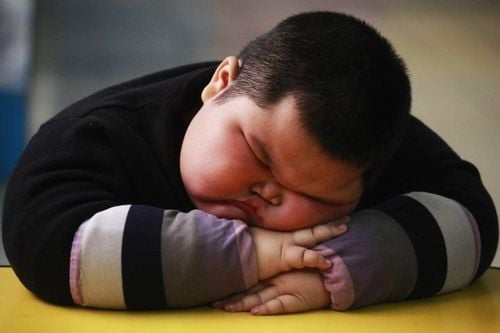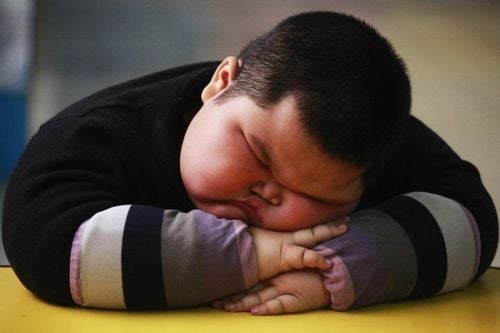This is an automatically translated article.
Young children who sleep too little are more likely to be obese than other children. Previous research has shown that sleep deprivation in children before the age of 4 increases the risk of obesity. However, new research published in the journal Pediatrics has observed that the link between children's sleep deprivation lasts from infancy to mid-childhood.
1. Children who lack sleep are easily obese
Dr. Elsie Taveras, chief of pediatrics at Massachusetts General Hospital for Children in Boston, said that inadequate sleep or sleep deprivation in children is an independent and strong risk factor for obesity in children and adolescents. accumulation of fat in the abdomen. The strength of this study is that it looked at sleep across multiple periods. Excess body fat in childhood sets the stage for serious health problems, such as heart disease and diabetes later in life.
Taveras and her team studied more than 1,000 children. Children who are sleep deprived are defined as less than 12 hours a day between the ages of 6 months and 2 years, less than 10 hours a day for ages 3 to 4 and less than 9 hours a day for ages 5. - 7. Research shows that sleep-deprived children are about 2.5 times more likely to be obese than children who sleep a lot. In addition, sleep-deprived children were also 2.5 times more likely to have total body fat, higher amounts of belly fat, and larger waist and hip measurements.
If children sleep too little, it will disrupt some of the hormones that regulate hunger and satiety levels of the body. In families where there is no consistent bedtime for children, mealtimes are also chaotic, which can affect weight.
Besides, sleep-deprived children may watch more TV than children who go to bed early. Television viewing has long been linked with eating more, especially for advertised foods.

Trẻ thiếu ngủ dễ béo phì và mắc một số bệnh lý khác
2. Short sleep duration and obesity
There have been studies reporting that a good night's sleep has other benefits for example it's really good at improving grades on school assignments. For this study, mothers reported how long their babies slept over a 24-hour period, starting at 6 months of age and annually throughout 1-7 years of age. The children had sleep scores ranging from 0 (not getting enough sleep) to 13 (getting enough sleep), the results showed an average sleep score of 10.2. However, about 4% of children in the group of children who did not get enough sleep with a score of 0 - 4 and about 40% with a score of 12 - 13 were said to be getting enough sleep. Research shows that children who sleep less than average are more likely to come from poorer families with less educated mothers.
Poor sleep is increasingly common in children and a link between short sleep duration in young children and obesity has always been found. Sleep duration, timing of meals, portion sizes, eating behavior, and changes in appetite-regulating hormones have been identified as factors that may form an association between sleep and obesity.
Obesity is common in the United States at a rate of 35% in adults and 17% in children. Short naps are also common, with more than 30% of adults sleeping less than 6 hours per night, only 20% of teenagers getting the optimal 9 hours of sleep on school nights, and a third of 3-year-olds sleeping. less than recommended. The association between short sleep duration and obesity has emerged in many epidemiological studies over the past decade.
Studies have consistently identified an association between napping during childhood (3-7 years) and obesity at that time or later. A recent longitudinal study also showed that chronic short sleep from infancy to school age was associated with increased indicators of obesity. Similar to most epidemiological studies, this analysis was based on parental-reported sleep. Short sleep duration is thought to lead to weight gain through hormonal changes involved in appetite regulation, namely leptin and ghrelin secretion. On the other hand, increased energy consumption is the main mechanism for weight gain after poor sleep. The behavioral mechanisms that promote childhood obesity may also be related to the time of day that children sleep, eat, and engage in sedentary activities. Excessive snacking will contribute to excessive weight gain in children.

Bệnh lý béo phì ở trẻ em có liên quan đến thời gian ngủ của trẻ
3. Advice for parents
Parents need to set a consistent bedtime for their children, limit the use of caffeinated beverages at the end of the day, remove all distractions like toys or electronic devices, and give them out of the child's bedroom. Children have to go to bed early, lack of sleep will change physiology, put the child's body into stress mode from which the body will understand that it needs to keep calories and accumulate fat. Studies are now looking at whether improving sleep can directly improve weight control in children.
Hopefully the above information has provided parents with an understanding of the evidence linking poor sleep to childhood obesity. Wish you always have a scientific child care regime to help children develop comprehensively.
Any questions that need to be answered by a specialist doctor as well as customers wishing to be examined and treated at Vinmec International General Hospital, please register for an online examination on the Website for the best service.
Please dial HOTLINE for more information or register for an appointment HERE. Download MyVinmec app to make appointments faster and to manage your bookings easily.













